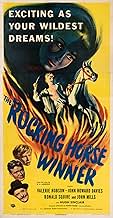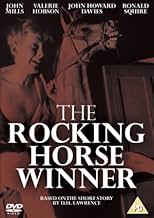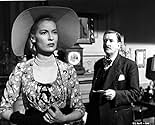AVALIAÇÃO DA IMDb
7,2/10
1,5 mil
SUA AVALIAÇÃO
Adicionar um enredo no seu idiomaA young boy receives a rocking horse for Christmas and soon learns that he is able to pick the winning horse at the races.A young boy receives a rocking horse for Christmas and soon learns that he is able to pick the winning horse at the races.A young boy receives a rocking horse for Christmas and soon learns that he is able to pick the winning horse at the races.
- Direção
- Roteiristas
- Artistas
Anthony Holles
- Bowler Hat
- (não creditado)
Melanie Mackenzie
- Matilda Grahame
- (não creditado)
Michael Ripper
- 2nd Chauffeur
- (não creditado)
Johnnie Schofield
- 1st Chauffeur
- (não creditado)
Caroline Steer
- Joan Grahame
- (não creditado)
- Direção
- Roteiristas
- Elenco e equipe completos
- Produção, bilheteria e muito mais no IMDbPro
Avaliações em destaque
The dialogue is expectedly very British and good. Though a perfunctory performance was all the needlessly limited role of the father required, all other players did wonderfully.
Interestingly, the story concerns a good, but sybaritic mother's avarice and her loving son's obsessive desire to satisfy it. It also plays into the idea of money as an inherent evil while earning my high praise by not taking this too far. It is also another one of many films I have enjoyed on the fascinating subject of gambling.
Interestingly, the story concerns a good, but sybaritic mother's avarice and her loving son's obsessive desire to satisfy it. It also plays into the idea of money as an inherent evil while earning my high praise by not taking this too far. It is also another one of many films I have enjoyed on the fascinating subject of gambling.
One day, a fine young lad, played by John Howard Davies, gets a wooden rocking horse for a Christmas gift by his favorite uncle, a rich uncle. His father is a butterfingers with money, as he bets and loses it, while his wife, played by Valerie Hobson, is constantly at him, saying they need more money, we simply must have it. She, by the way, is used to having her way and used to living beyond their means. The uncle is her brother who has gotten them out of more than one financial scrape, who now refuses to do it anymore. He's done. The boy discovers by getting on the horse and rocking, that the horse not only talks to him, but gives him tips on the winners at the horse track. By way of betting through the groundskeeper, played by John Mills, the young boy amasses gads of money. And yet, what starts as a fantasy and a somewhat whimsical little film takes a dramatic and scary turn. This film has a little bit of everything for everyone: fantasy, humor, drama, and even a bit of the Gothic touch. The lesson to be learned from this film is simple: do not argue, or discuss money issues, in front of your children. One feels that maybe writer D. H. Lawrence, who wrote the short story from which this was based, may have lived a similar type of childhood but to a degree obviously. If it's draining for an adult, how do you think it makes children feel? This climax is made for a point for all adults - to learn from and change. A very dramatic and memorable film is "The Rocking Horse Winner." All the actors were exceptional, including the young lad, but the real star of the story is author D. H. Lawrence's imagination that tries to teach people the only way he can.
This is a very intriguing British film, quite unlike most others from the period; it's a pretty dark Freudian tale, from a D H Lawrence short story, whose overt depiction of a schoolboy and his magic toy gets away with a strictly taboo subtext. The focus is on a well-to-do household of the period, in which the hierarchy of adults and children is strictly defined; the parents try to keep their son Paul, wearing short trousers even in the depths of winter, innocent of their adult concerns in particular, their problems with money. After discovering that his rocking horse gives him secret powers when he rides it hard enough, with giddy camera-work showing how it feels when he 'gets there', the boy tries to usurp his father's role to provide his mother with what she needs. John Mills produced the film, and his interest was no doubt linked to his typecast image: he normally plays rather piously unimpeachable characters, so it's quite a shock to see him here directing the lad's first experience of 'riding'. The only slight difficulty is that the boy actor needed to be nearer his early teens to carry the weight of the story's darker implications.
I've seen a few rocking horses in my time, but none that looked like this one. With its predatory teeth, gaping mouth, and flaring eyes, it looks more like Halloween than X-mas. No wonder it's got supposedly demonic powers. But then the social-climbing parents need help of the monetary kind. Mom (Hobson) isn't happy with just a big house and servants. She wants top status among the British upper-class, and by golly she'll spend whatever it takes, affordable or not. Meanwhile, Dad (Sinclair) tries to keep up by losing at gambling, while Uncle Oscar (Squire) is finally fed up with doling out money from the family trust. That leaves the kids (Davies, et.al.) to make out as best they can with neglectful parents. So where will the money come from, and how will the kids connect with Mom. Enter an infernal toy.
I can see the premise being done on the Twilight Zone, but certainly not to better effect. With his rather narrow eyes, little Paul (Davies) is positively scary when demonically whipping both himself and the wooden horse into a sweaty frenzy. A thousand gory films could not register more strongly than these inspired scenes. It's a unnerving spectre that moves the entire film into a special category of its own.
Surprisingly, the suspense of the rocking horse is not built up in the movie's main part. Instead, the film's majority deals with more ordinary matters: placing bets, pawning dresses, Uncle Oscar, Bassett (Mills) and Paul. Thus a natural contrast is laid for the demonic scenes. Nonetheless, the acting is first-rate, though Sinclair pretty much fades into the background as Dad, while Hobson's mom takes center stage in sleekly determined fashion. Then again, Mills is especially winning as the humane handy man. Happily, he furnishes needed companionship for the lonely boy. And, given the parent's upper-class pretensions, I detect a comment on the effects of Britain's traditional class system.
To me, however, it's never clear whether the whispering comes from the house or from Paul's internalizing of the family's money troubles. But, either way, the never-ending need for picking race-horse winners drives poor Paul into continuing his rocking horse frenzy. The tragedy lies in the personal toll this takes on him for the sake of his generally oblivious mother. Still, it is possible, unless I missed something, that Paul is just lucky picking winners rather than rocking horse possessed. After all, he wants to think he's lucky and maybe he is. In that case, no supernatural would be involved. Instead the upshot would be how an imaginative boy internalizes overriding family greed. In that case, I think the ending would be even more tragic. I may be mistaken, but I don't think the screenplay forecloses this second possibility. Either way, however, those final scenes are genuinely memorable.
Speaking of endings, it's certainly not one Hollywood's Motion Picture Code would have permitted. Good for the British. Because what we're left with is a truly remarkable one-of-a- kind, whose moral is as timely now as 6 decades ago. Don't miss it.
I can see the premise being done on the Twilight Zone, but certainly not to better effect. With his rather narrow eyes, little Paul (Davies) is positively scary when demonically whipping both himself and the wooden horse into a sweaty frenzy. A thousand gory films could not register more strongly than these inspired scenes. It's a unnerving spectre that moves the entire film into a special category of its own.
Surprisingly, the suspense of the rocking horse is not built up in the movie's main part. Instead, the film's majority deals with more ordinary matters: placing bets, pawning dresses, Uncle Oscar, Bassett (Mills) and Paul. Thus a natural contrast is laid for the demonic scenes. Nonetheless, the acting is first-rate, though Sinclair pretty much fades into the background as Dad, while Hobson's mom takes center stage in sleekly determined fashion. Then again, Mills is especially winning as the humane handy man. Happily, he furnishes needed companionship for the lonely boy. And, given the parent's upper-class pretensions, I detect a comment on the effects of Britain's traditional class system.
To me, however, it's never clear whether the whispering comes from the house or from Paul's internalizing of the family's money troubles. But, either way, the never-ending need for picking race-horse winners drives poor Paul into continuing his rocking horse frenzy. The tragedy lies in the personal toll this takes on him for the sake of his generally oblivious mother. Still, it is possible, unless I missed something, that Paul is just lucky picking winners rather than rocking horse possessed. After all, he wants to think he's lucky and maybe he is. In that case, no supernatural would be involved. Instead the upshot would be how an imaginative boy internalizes overriding family greed. In that case, I think the ending would be even more tragic. I may be mistaken, but I don't think the screenplay forecloses this second possibility. Either way, however, those final scenes are genuinely memorable.
Speaking of endings, it's certainly not one Hollywood's Motion Picture Code would have permitted. Good for the British. Because what we're left with is a truly remarkable one-of-a- kind, whose moral is as timely now as 6 decades ago. Don't miss it.
This is about a British family. The mother (Valerie Hobson) spends beyond her means. The father gambles...badly and loses his job. The family is close to bankruptcy when their young son Paul (John Howard Davies) develops this uncanny ability to predict winners in horse races. How does he do it? By riding his rocking horse.
I read the D.H. Lawrence short story back in college in the 1980s and never forgot it. I heard about this film but was afraid to see it...I didn't think there was any way to film the story without it looking stupid. Also this movie is hard to find. I finally did catch it and I was impressed. They managed to take a very dark and strange short story and make an excellent movie out of it. It moves quickly (it's only 90 minutes) and I was never bored for one second. The acting really helps to carry this one. Hobson is just OK as the mother but Davies as the little boy, John Mills as Bassett and Ronald Squire as Uncle Oscar are just great. Ultimately the movie is sad and depressing but just incredible. This was way too ahead of its time to connect with audiences of 1950 and it (sadly) remains unknown to this day. Well worth seeing.
I read the D.H. Lawrence short story back in college in the 1980s and never forgot it. I heard about this film but was afraid to see it...I didn't think there was any way to film the story without it looking stupid. Also this movie is hard to find. I finally did catch it and I was impressed. They managed to take a very dark and strange short story and make an excellent movie out of it. It moves quickly (it's only 90 minutes) and I was never bored for one second. The acting really helps to carry this one. Hobson is just OK as the mother but Davies as the little boy, John Mills as Bassett and Ronald Squire as Uncle Oscar are just great. Ultimately the movie is sad and depressing but just incredible. This was way too ahead of its time to connect with audiences of 1950 and it (sadly) remains unknown to this day. Well worth seeing.
Você sabia?
- CuriosidadesBassett says that he had "... fine plans for teaching Gordon Richards a thing or two...". Gordon Richards (1904 - 1986) was an English jockey. He was the Champion Jockey in British flat horse-racing 26 times, a record that still stands.
- Citações
[last lines]
Hester Grahame: I wanted to see the end of it, just wanted to be sure it had gone. Gone for good.
Bassett: You won't never see the end of it, ma'am, nor will I. As long as ever we'll live, we'll remember, and we'll know just what it is was done.
- Trilhas sonorasSilent Night
(uncredited)
Music by Franz Xaver Gruber
English lyrics by John Freeman Young
Sung by the carollers
Principais escolhas
Faça login para avaliar e ver a lista de recomendações personalizadas
Detalhes
- Data de lançamento
- País de origem
- Idioma
- Também conhecido como
- The Rocking Horse Winner
- Locações de filme
- Denham Studios, Denham, Buckinghamshire, Inglaterra, Reino Unido(studio: made at Denham Studios, London, England)
- Empresas de produção
- Consulte mais créditos da empresa na IMDbPro
- Tempo de duração
- 1 h 31 min(91 min)
- Cor
- Proporção
- 1.37 : 1
Contribua para esta página
Sugerir uma alteração ou adicionar conteúdo ausente



























